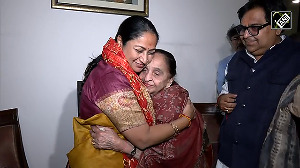The World Bank approved on Wednesday one of its largest support packages to India with a $600 million loan and credit designed to transform access to financial services for Indian farmers.
The Strengthening Rural Credit Cooperatives Project supports the government of India's programme to reform and revitalise the country's rural Credit Cooperative Banks.
These include some 31 state cooperative banks, 367 district central cooperative banks and over 100,000 primary agricultural credit societies. The goal is to transform them into efficient and commercially viable institutions responsive to the financial service needs of India's poorer farmers, including small and marginal farmers, the Bank said in a statement.
"Since the early 1990s, India has introduced impressive financial sector reforms that have resulted in increased competition, diversification, openness and depth.
"Yet, India's rural population still has limited access to finance from formal sources, relying instead on extortionate money lenders. The problem is particularly severe for small and marginal farmers, who are among the poorest of India's rural dwellers farming, respectively, less than one acre and between one and four acres of land." the Bank said.
The estimates suggest that some 87 per cent of marginal farmers and 70 per cent of small farmers have no access to credit from a formal financial institution.
"Better access to finance for India's rural poor is absolutely critical for higher rural growth, for reducing inequality, and ultimately, alleviating poverty," said Isabel Guerrero, World Bank Country Director for India.
By providing small farmers with improved financial services, such as credit, savings, remittances and insurance, this project will play a significant role in helping India's rural poor benefit from growth opportunities, Guerrero said. Twelve Indian states, Andhra Pradesh, Arunachal Pradesh, Bihar, Gujarat, Harayana, Madhya Pradesh, Maharashtra, Orissa, Rajasthan, Uttar Pradesh, Uttarakhand and West Bengal have signed the Memoranda of Understanding with the Government of India and the National Bank for Agriculture and Rural Development to the reform programme.
Potentially viable CCBs in those states will commit to a set of far-reaching legal, regulatory, governance and institutional reforms which will open the way to financial and operational restructuring. In the process the CCBs will be recapitalised with grants to wipe out the accumulated losses, the value of members' capital will be restored, and a minimum capital to risk weighted assets ratio (CRAR) of 7 per cent will be achieved.
The project will also provide technical assistance throughout the process to strengthen CCB governance, managerial and operational performance, and support the computerisation for enhanced efficiency and transparency.
"The project will transform India's rural credit cooperative banks into efficient and commercially viable institutions that can provide financial services to the poorest farmers at affordable terms," said Priya Basu, World Bank Lead Economist and project team leader.
The loan from the International Bank for Reconstruction and Development has 20 years maturity, including a five year grace period. The credit is provided by the International Development Association, the World Bank's concessionary lending arm and has 35 years to maturity and a 10-year grace period.






 © 2025
© 2025